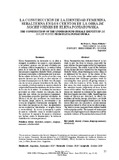| dc.rights.license | http://creativecommons.org/licenses/by-nc-sa/3.0/ve/ | es_VE |
| dc.contributor.author | Di Mare L, María Fabiola | |
| dc.date.accessioned | 2020-06-22T04:14:28Z | |
| dc.date.available | 2020-06-22T04:14:28Z | |
| dc.date.issued | 2020 | |
| dc.identifier.uri | http://www.saber.ula.ve/handle/123456789/46834 | |
| dc.description.abstract | Elena Poniatowska ha dedicado en su obra a
otorgarle la palabra a las mujeres, especialmente
a las pobres, quienes son las más olvidadas por
el sistema cultural hegemónico. La autora forma
parte de la tradición de la literatura no-fi ccional
iniciada por el argentino Rodolfo Walsh, al trabajar
los temas silenciados o deformados por la prensa.
En los relatos del texto De noche vienes hace una
apuesta literaria que desafía su obra anterior al
ejecutar el mismo proceso de darle voz a la mujer
con los recursos propios del relato de fi cción. En
ese sentido, el trabajo analiza la construcción de la
subjetividad femenina subalterna de dichos relatos
de fi cción de la autora. Se analizan las tensiones
presentes en estos cuentos en relación con la
opresión que sufren sus personajes femeninos.
Se bosquejan pequeños pueblos olvidados de
México en los que perduran las tradiciones
de familia, linaje, herencia, servidumbre y las
creencias religiosas fuertemente arraigadas. En
los relatos hay prejuicios de clase, desigualdades
socioeconómicas vinculadas al origen étnico
o sociocultural. Se recrea la memoria a partir
de marcas culturales como la oralidad popular.
Se construye la memoria de mujeres anónimas
que luchan contra la dominación y la violencia
simbólica del sistema patriarcal. | es_VE |
| dc.language.iso | es | es_VE |
| dc.publisher | SaberULA | es_VE |
| dc.rights | info:eu-repo/semantics/openAccess | es_VE |
| dc.subject | Identidad | es_VE |
| dc.subject | Mujeres | es_VE |
| dc.subject | Lenguaje | es_VE |
| dc.subject | Memoria | es_VE |
| dc.subject | Subalternidad | es_VE |
| dc.title | La construcción de la identidad femenina subalterna en los cuentos de la obra De noche vienes de Elena Poniatowska | es_VE |
| dc.title.alternative | The construction of the underground female identity in De noche vienes from Elena Poniatowska | es_VE |
| dc.type | info:eu-repo/semantics/article | es_VE |
| dcterms.dateAccepted | Octubre-2019 | |
| dcterms.dateSubmitted | Octubre-2019 | |
| dc.description.abstract1 | Elena Poniatowska has dedicated herself in her
work to give the fl oor to women, especially the
poor, who are the most neglected by the hegemonic
cultural system. The author is part of the tradition
of non-fi ction literature initiated by the Argentine
Rodolfo Walsh, when working on issues silenced
or deformed by the press. In the stories of the
text De noche vienes, the author makes a literary
commitment that challenges previous work by
executing the same process of giving women a
voice with the resources of the fi ction story. In
that sense, the work analyzes the construction of
the subaltern female subjectivity of these fi ction
stories of the author. The tensions present in these
stories are analyzed in relation to the oppression
that their female characters suff er. Small forgotten
towns of Mexico are sketched, in which the
traditions of family, lineage, inheritance, servitude
and strongly rooted religious beliefs persist. In the
stories there are class prejudices, socioeconomic
inequalities linked to ethnic or sociocultural origin.
The story recreates memory from cultural brands
such as popular orality. The memory of anonymous
women who fi ght against male domination and the
symbolic violence of the patriarchal system is built. | es_VE |
| dc.description.colacion | 35-44 | es_VE |
| dc.description.email | revistacifranueva@gmail.com | es_VE |
| dc.description.email | fdimare@gmail.com | es_VE |
| dc.description.frecuencia | Semestral | |
| dc.description.paginaweb | http://www.saber.ula.ve/cifranueva/ | |
| dc.identifier.edepositolegal | ppi 201202ME4019 | |
| dc.identifier.eissn | 2244-8438 | |
| dc.publisher.pais | Venezuela | es_VE |
| dc.subject.institucion | Universidad de Los Andes | es_VE |
| dc.subject.keywords | Identity | es_VE |
| dc.subject.keywords | Women | es_VE |
| dc.subject.keywords | Language | es_VE |
| dc.subject.keywords | Memory | es_VE |
| dc.subject.keywords | Subalternity | es_VE |
| dc.subject.seccion | Cifra Nueva: Artículos | es_VE |
| dc.subject.tipo | Monografías | es_VE |
| dc.type.media | Texto | es_VE |


